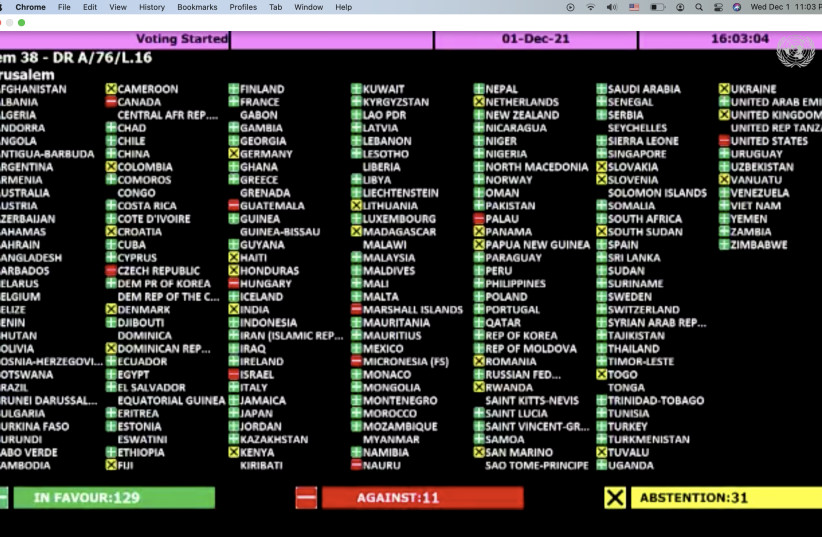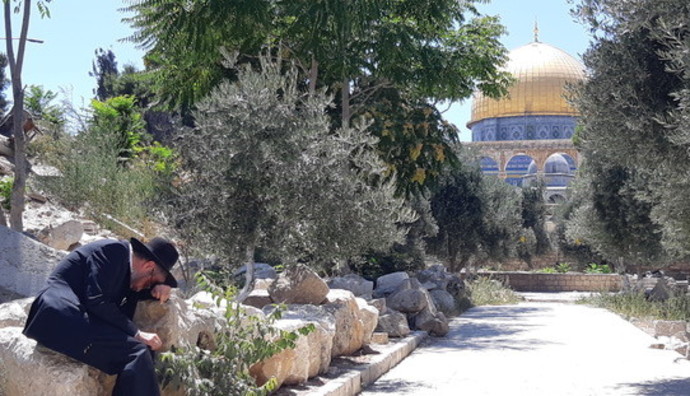The United Nations General Assembly approved a resolution 129-11 on Wednesday that disavowed Jewish ties to the Temple Mount and called it solely by its Muslim name of al-Haram al-Sharif.
The text, referred to as the “Jerusalem resolution,” is part of a push by the Palestinian Authority and the Arab states across the UN system to rebrand Judaism’s most holy site as an exclusively Islamic one.
The United States, which opposed the text, said that the omission of inclusive terminology for the site sacred to three faiths was of “real and serious concern.”
Located in the heart of Jerusalem’s Old City, it is where the ancient Jewish Temple stood 2,000 years ago, and it is the home of the Aksa Mosque compound which is Islam’s third holiest site.
“It is morally, historically and politically wrong for members of this body to support language that denies” both the Jewish and Christian connections to the Temple Mount and al-Haram al-Sharif, the US envoy told the UNGA.
The US has not been the only country to voice concern over the lack of inclusive language. In an attempt to ensure support for the resolution, its authors had made some small amendments since the General Assembly last approved the resolution in 2018 by 148-11. That text referenced al-Haram al-Sharif twice, once in the action portion of the resolution and once in the introduction.
This time, the phrase al-Haram al-Sharif was mentioned only once in the introduction. Despite this shift, support for the resolution dropped, with the number of countries that abstained more than doubling from 14 to 31.
Three years ago, all the European countries supported the text; this year a number of them changed their votes.
Hungary and the Czech Republic opposed the resolution, while Austria, Bulgaria, Denmark, Germany, Lithuania, the Netherlands, Romania, Slovakia and Slovenia abstained.
A British envoy said that “the resolution adopted today refers to the holy sites in Jerusalem in purely Islamic terms without recognizing the Jewish terminology of Temple Mount.
“The UK has made clear for many years that we disagree with this approach – and while we welcome the removal of the majority of these references, we are disappointed that we were unable to find a solution to the final reference,” the envoy said.
“The UK has therefore moved our vote today from a ‘yes’ to an ‘abstention.’ If the unbalanced reference had been removed, the UK would have been ready and willing to vote ‘yes,’” he said.
“This should not be misunderstood as a reflection of a change in UK policy toward Jerusalem. Instead, it is an important signal of our commitment to recognizing the history of Jerusalem to the three monotheistic religions.”
The EU took a middle-of-the-road stance, welcoming amendments the PA and the Arab groups made to reduce the annual number of some 20 resolutions on Israel which they present to the UNGA for approval.
“The EU reiterates that whenever referring to the Temple Mount/al-Haram al-Sharif in the Jerusalem resolution, both terms, ie, Temple Mount and al-Haram al-Sharif should be used,” an EU representative said.
The same is true for any text relating to Jerusalem, he explained.
“The EU calls on all sides not to deny the historical ties of other religions to the city of Jerusalem and its holy places, thus trying to delegitimize their history,” the envoy said.
In spite of his words, a fair number of EU member states approved the text, including Belgium, France, Spain and Italy.
Palestinian Ambassador to the UN Riyad Mansour thanked those who support the Jerusalem text, noting that it was “an appropriate and needed resolution to give hope and support to our people.”
It pushed back at attempts to transform the Israeli-Palestinian conflict into a “religious confrontation,” Mansour said, adding that it relied on language on Jerusalem which had already been approved in UN Security Council resolutions.
He called on the UN to accept Palestine as a member state and to hold Israel accountable for its refusal to withdraw to the pre-1967 lines, so that a two-state resolution to the conflict can be implemented.
“We will never accept to continue living under occupation in an apartheid system; we deserve freedom and dignity in our homeland,” Mansour said.
Israel’s Ambassador to the UN Gilad Erdan accused the Palestinians of attempting to erase Jewish history.
“The hypocrisy of these resolutions is truly outrageous. A resolution about Jerusalem that does not refer to its ancient Jewish roots is not an ignorant mistake, but an attempt to distort and rewrite history!” Erdan exclaimed in a speech to the UNGA in advance of the vote.
He described how central Jerusalem is to Jewish religious celebrations.
“At every Jewish wedding ceremony, the newly married couple stands under the wedding canopy and pledges to never forget their deep Jewish connection to Jerusalem: ‘If I forget you, O Jerusalem, may my right hand lose its skill,’” Erdan said.
The vote took place on the fourth day of the Hanukkah festival, in which Jews around the world celebrate the victory of the Maccabee warriors over the Greeks and their reclamation of the ancient Jewish Temple in 164 BCE.
It was one of three texts on Israel approved by the UNGA.
The assembly voted 148-9, with 14 abstentions, on another resolution called the Peaceful Settlement of the Question of Palestine, which demanded that Israel withdraw to the pre-1967 lines and that the international community refuse to “render assistance” to settlement activity. It also called for an international peace conference in Moscow.
The countries that opposed the text were Australia, Canada, Hungary, Israel, Marshall Islands, Micronesia, Nauru, Palau and the United States.
The third resolution, approved 94-8 with 69 abstentions, called on Israel to withdraw from the Golan. Those who opposed it were Australia, Canada, Israel, Marshall Islands, Micronesia, Palau, the United Kingdom and the United States.


